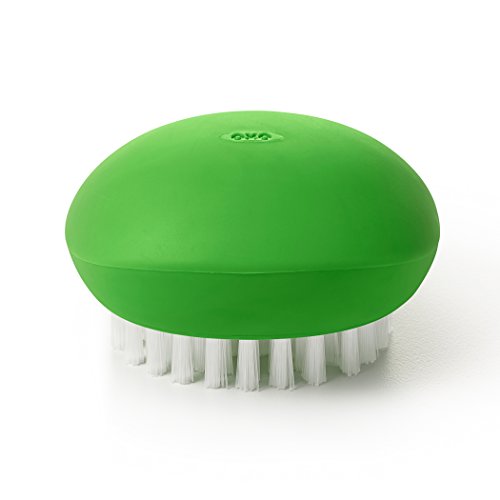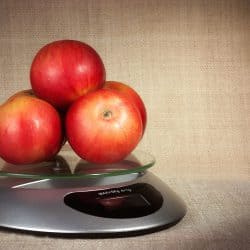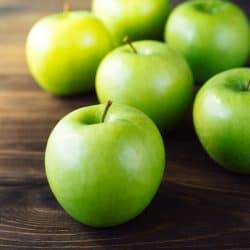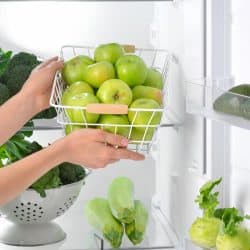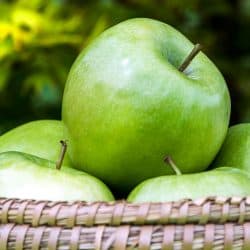Apples often rank as one of the healthiest fruits—but they're also on lists of the most pesticide-laden produce items. The simplest way to remove nasty chemicals on your apples is to give them a nice wash with tap water. But what about pre-washing your apples? If you're wondering whether to wash apples before storing them, you've got to check out the research we've compiled below.
You should only wash an apple before you're about to eat it. Washing apples ahead of time will dramatically reduce their shelf-life. No matter how well you dry your pre-washed apples, they won't last as long in storage as unwashed apples.
While washing with plain old tap water is OK, there are many other effective methods for cleaning apples. Whether you like Galas, Granny Smiths, or Cosmic Crisps, the cleaning tips below will help you polish your apples like a pro.
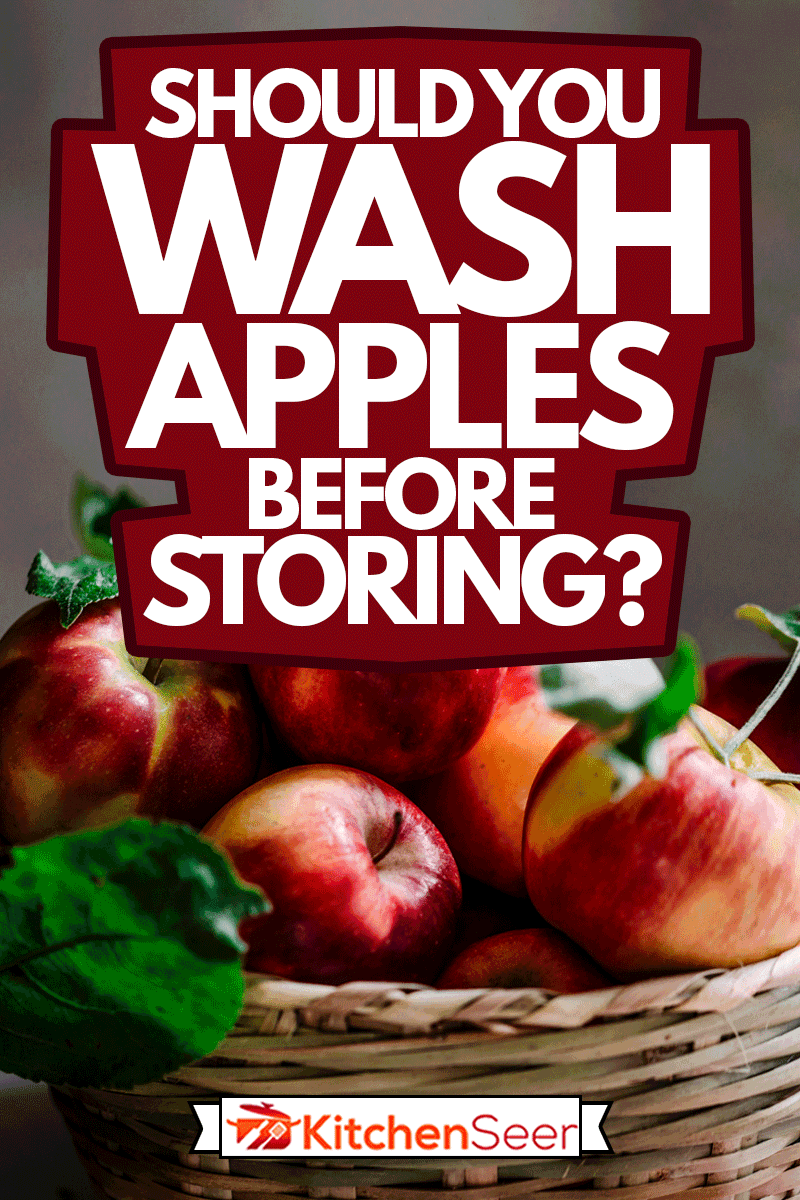
Should You Wash Apples Before Storing?
Food storage experts never recommend washing your apples before storing them. Even a short soak will soften your apple's skin. After just a few days, you may notice these pre-washed apples turn mushy or show signs of rot and mold.
Apples that are washed before storage don't last as long as non-washed apples. Even if your pre-washed apples aren't "bad" to eat, they probably won't taste as crisp and delicious as you'd like.
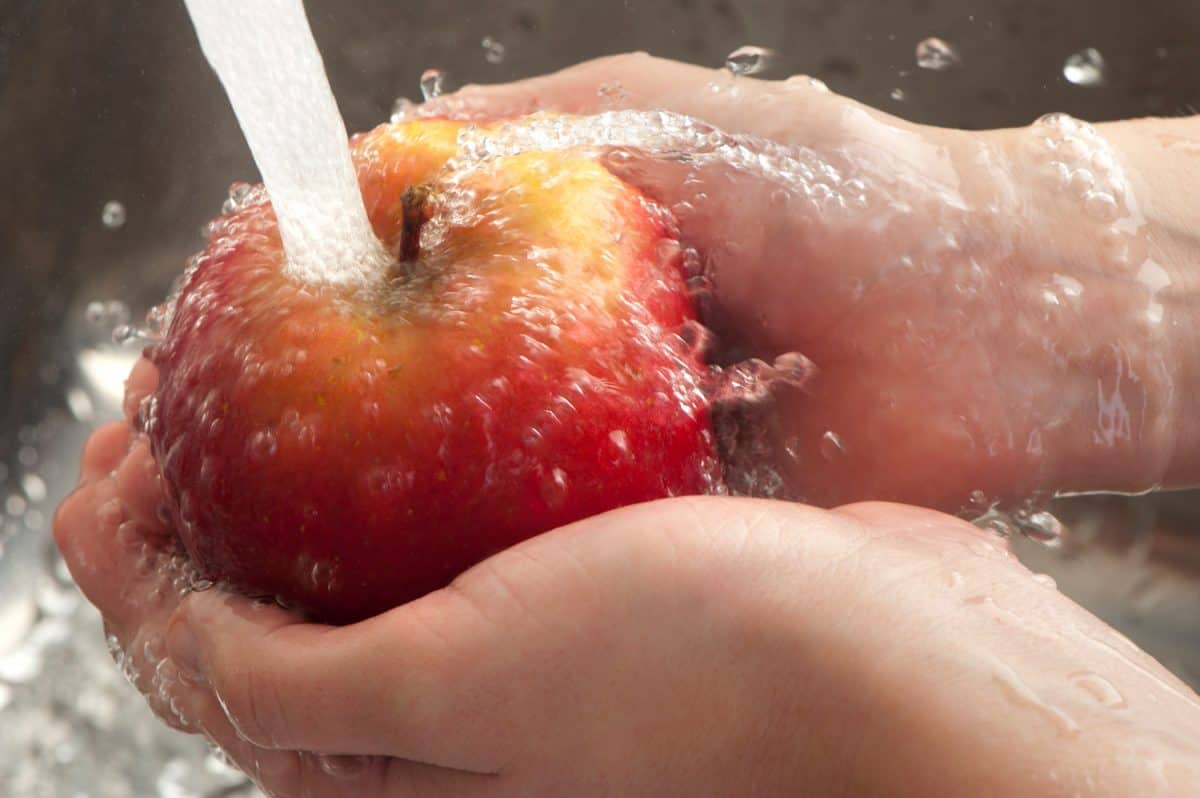
For the best results, please wash your apples before you're going to enjoy them.
What's The Best Way To Store Apples?
Unless you live in a particularly humid environment, apples should last at room temperature for about one week. However, you could dramatically increase this shelf-life by putting your apples in the fridge.
A temperature between 30 - 35° F is your best bet for keeping apples fresh for a few months. Indeed, most nutritionists claim apples in the fridge could last about 6 - 8 weeks.
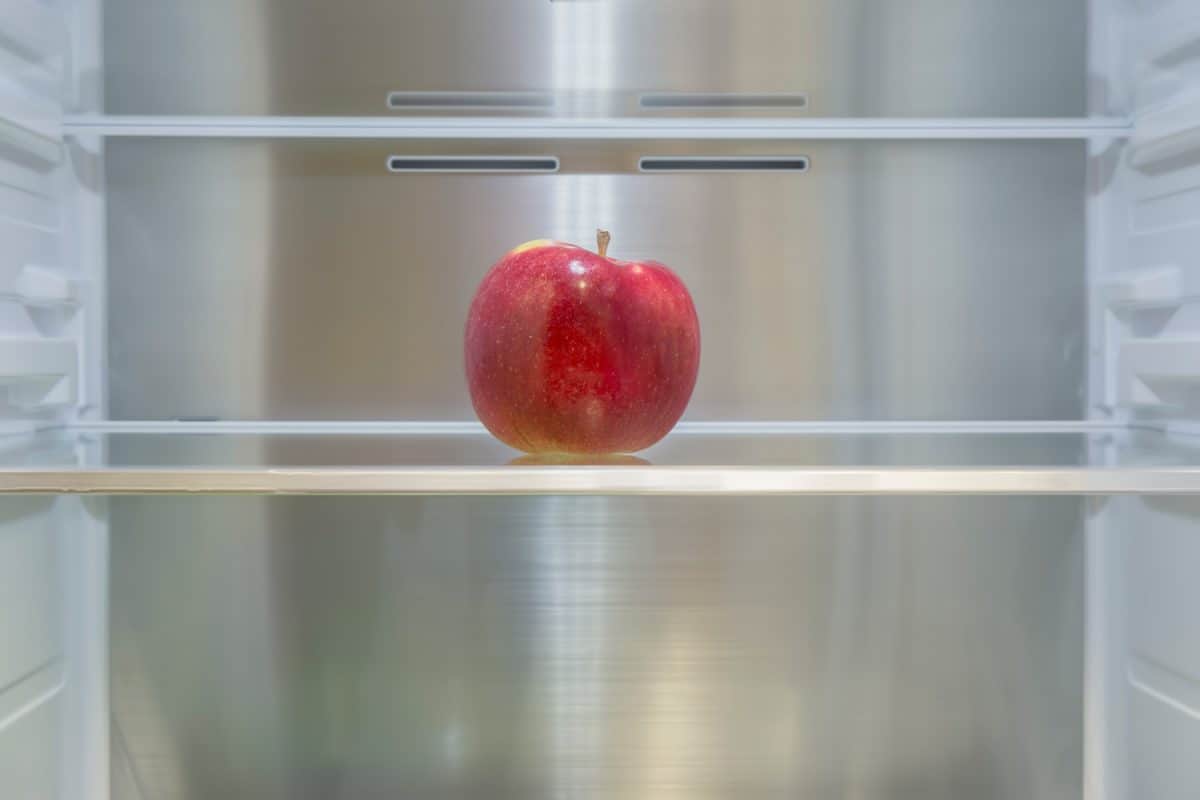
By the way, if you're baking an apple pie with your batch of apples, you've got to check out our article on "Does Apple Pie Freeze Well?"
Should You Store Apples In Airtight Containers?
Please don't store apples in an airtight container. If you wrap apples in an airtight container, it will trap a chemical called ethylene gas. This natural gas occurs as apples ripen, and it will get intensified in an oxygen-free environment. So, your apples will go bad faster if you keep them in airtight containers.
Interestingly, many people use this ethylene gas to speed up the ripening process deliberately. For instance, some foodies place their avocados in paper bags with an apple to get them nice and soft.
You could learn more about this kitchen trick in our previous post, "Does Microwaving An Avocado Soften It?"
Should You Scrub Your Apples While Washing Them?
Scrubbing apples is an optional step, but some studies suggest it may be worth the extra effort. Compared with a simple tap water rinse, apples that get a scrub have fewer bacteria and pesticides.
If you don't already have a vegetable scrubber, you may want to consider getting one for your apples.
Find out more on this Amazon link.
What To Soak Apples In To Clean Them?
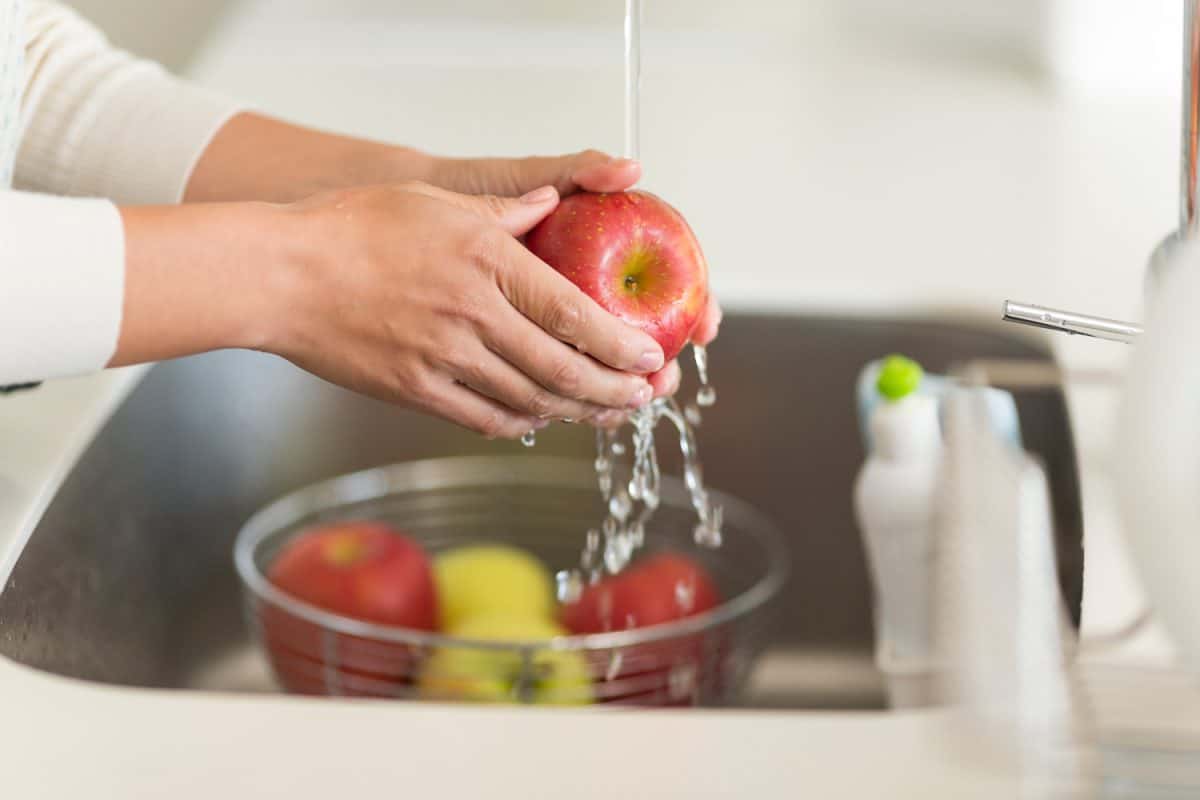
Arguably, the most effective way to clean apples is to soak them in a mix of distilled vinegar and water. Studies out of China's Nanjing Agricultural University found a mixture of white vinegar and water effectively kills many pesticides.
To use this method, fill a large bowl with cool tap water and add about ⅓ cup of distilled white vinegar. You could adjust this measurement depending on the size of your bowl. Let your apples soak in this vinegar bath for about 15 minutes.
Lastly, remove your apples from the water and wash them with cool tap water. Dry them thoroughly with a clean towel before eating.
To learn more about using vinegar to clean produce, please watch this video.
Is It OK To Wash Apples With Dish Soap?
Never use dish soap to clean your apples. No matter how well you think you've washed your apples, soap chemicals will get into your fruit.
Even in tiny amounts, soap could have bad effects on your health. For your safety, please avoid using dish soap when cleaning anything you're about to eat.
Can You Wash Apples With Hydrogen Peroxide?
Although it's not as common as vinegar or baking soda, you could safely wash your apples with a mix of water and 3 percent hydrogen peroxide.
Some people like to fill a bottle with a 50/50 mix of these ingredients and spray their apples before washing and drying them.
Alternatively, you could fill a bowl with lukewarm water and add about ½ cup of hydrogen peroxide. Let this mix sit for at least 10 minutes, then remove the apples from the water. Wash your apples thoroughly with cool tap water and dry them with a clean towel.
How To Remove Wax From Apples With Boiling Water?
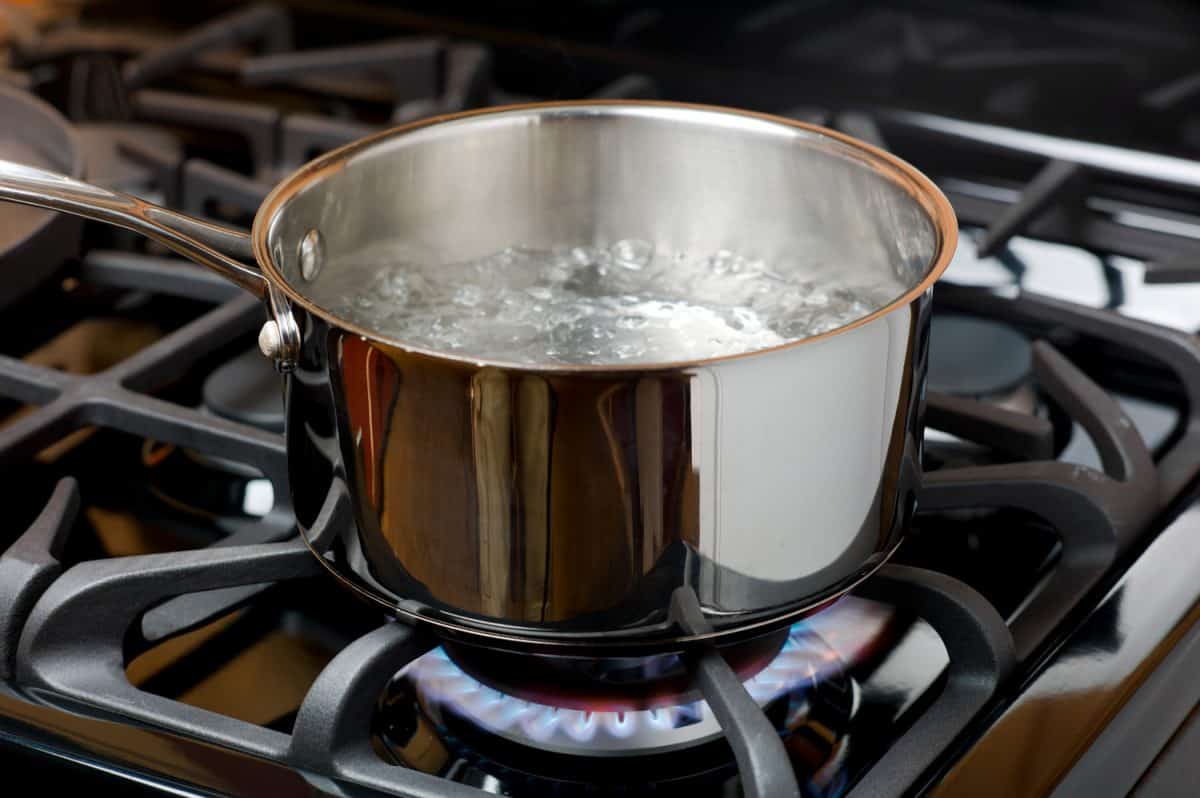
To remove apples' waxy outer coating, you could dunk them in boiling water for about ten seconds, scoop them out of the pot, and dry them with a clean towel. For extra help, you could add ~ ¼ cup of distilled white vinegar to your boiling water.
You can see a demonstration of this method in the video below.
How To Get Wax Off Apples With Baking Soda?
Believe it or not, research from the University of Massachusetts suggests baking soda gets rid of more pesticides on apples compared with bleach. You could also use a baking soda and water solution to remove wax from your apples.
Here's an easy way to use baking soda to clean apples:
- Place your apples in a bowl and sprinkle a few teaspoons of baking soda over them.
- Fill the bowl with lukewarm water until the apples are fully submerged.
- Let this mix sit for roughly 15 minutes.
- Remove your apples and scrub with a vegetable scrubber.
- Rinse with cool tap water.
- Dry with a clean towel.
You can see a demonstration of this baking soda strategy below:
Do I Have To Wash Organic Apples?
Just because apples have a "USDA Organic" label doesn't mean you shouldn't wash them. Plenty of pesticides are approved for organic farmers. Also, there's no telling what kinds of nasty bugs worked their way onto your apples during transit.
Even if you get your apples from the cleanest farmer's market in town, you should always wash them before eating or baking.
Should You Always Cut Off An Apple's Skin?
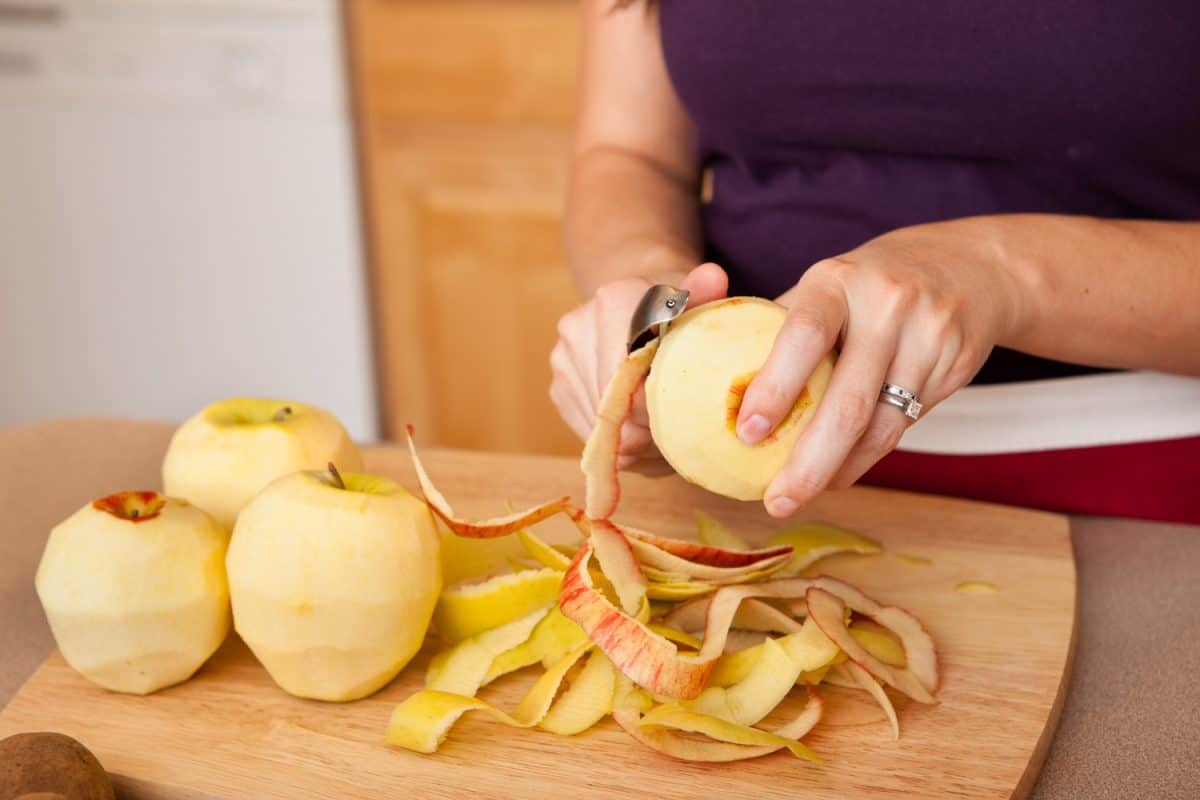
There's a big debate over whether it's "better" to cut off an apple's skin. True, even baking soda can't remove 100 percent of pesticides. However, nutritionists point out that an apple's skin is jam-packed with nutrients.
For instance, recent reports suggest apples with the skin on have 300 percent more vitamin K than peeled apples. Also, if you use vinegar or baking soda baths, you should remove most of an apple's bad chemicals.
On the other hand, you will have a higher chance of eating some pesticides if you leave the skin on.
Unfortunately, there's no easy answer to this question. You will have to decide whether you feel comfortable eating apples with or without the skin.
By the way, if you want to see how the pros peel apples, check out this YouTube video:
Is It OK To Spray Apples With Water?
If you have the option to spray or wash an apple, it's better to wash it in the sink. Washing will remove chemicals and debris more effectively than a simple spray.
However, you could easily make a DIY produce spray with diluted vinegar or hydrogen peroxide. There are also commercially available baking soda sprays well-suited for apples.
Find out more on this Amazon link.
All you have to do is spray this mix on your apples, let it sit for a few minutes, and wash it off with tap water. While this might not be as thorough as soaking apples in a vinegar bath, it's way more convenient.
Always Wash Your Apples...Just Not Before Storing Them!
Apples aren't a "prep-friendly fruit." Not only does this fruit turn brown after you cut it, but it will also spoil faster if you wash it before storage.
Please hold off washing your apples before storing them in your kitchen. For the best results, wash your apples just before you're going to use them.
Consider adding vinegar, baking soda, or a scrubbing brush to your washing routine for extra cleaning power. Just remember to reserve dishwashing soap for your dirty plates, not your dirty fruit!

